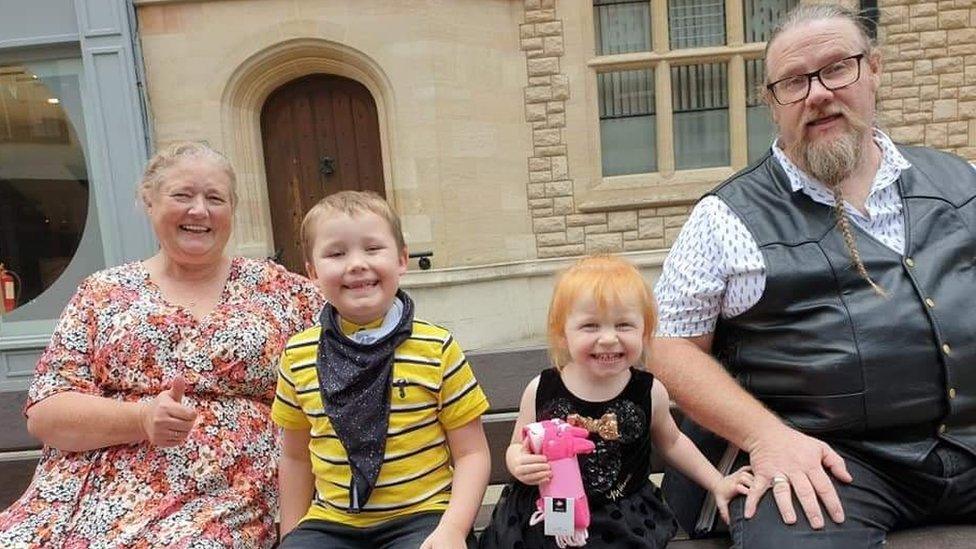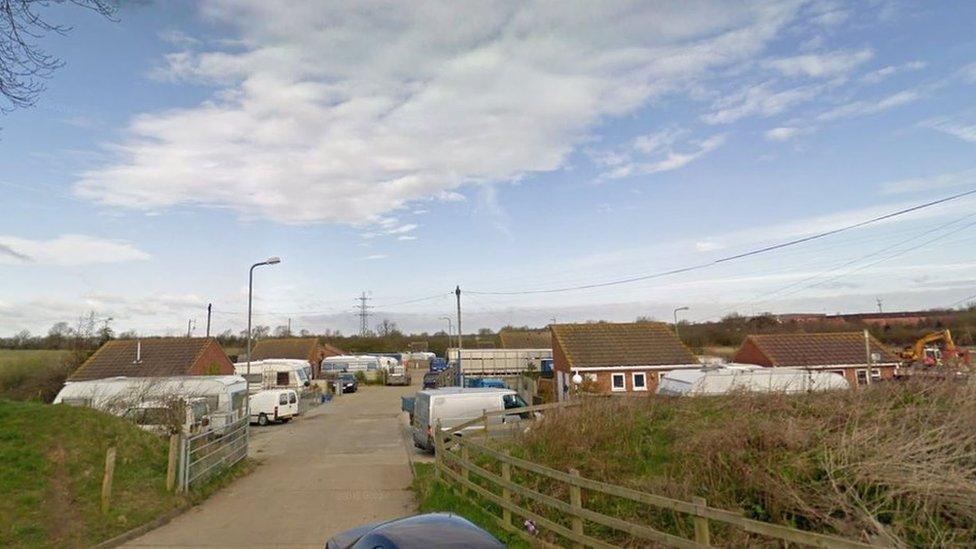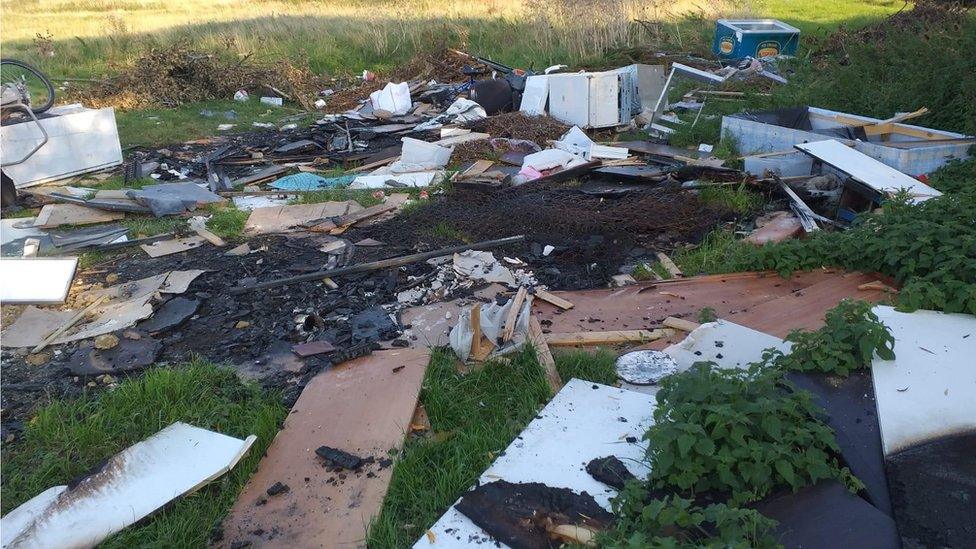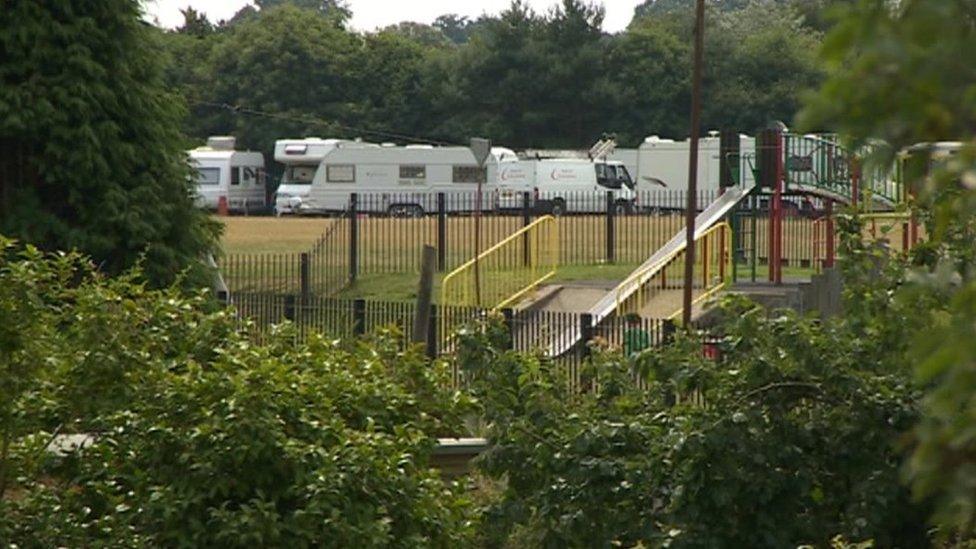Travellers: Shocking lack of pitches for families, charity warns
- Published

Bethany and her two children have been on a waiting list for more than a year
There is a "shocking" lack of places for traveller families to live in England, according to a charity.
Only 18 out of 251 registered traveller sites have any spaces available, research from Friends, Families and Travellers (FFT) suggests.
It says the government must "do more" to identify land for the community to live on.
The government says councils are "best placed" to assess the local need for permanent traveller sites.
In October, FFT wrote to all local authorities and private registered site providers in England to ask how many pitches they had available.
It received responses relating to 251 out of 266 traveller sites - which represented 3,482 permanent pitches and 304 transit pitches.
A transit pitch is a short-term place where people can stay for a set period of usually up to three months.
The research, external found:
There were 13 permanent sites and five transit sites with available pitches
There were 59 permanent pitches and 42 transit pitches available
At least 1,696 households are on waiting lists for pitches on traveller sites

Bethany says she's near the bottom of the waiting list for a pitch in her local area
Bethany Rose, 26, and her two children have been on a waiting list for a pitch in West Sussex for more than a year.
She is currently staying with her parents in their caravan on a registered traveller site. But this is against the rules of their tenancy contract and she will have to move out once the coronavirus pandemic is over.
Bethany has a health condition which means she can often be paralysed from the waist down and she needs to be close to her mum who is her carer.
"It's frustrating, annoying, aggravating, I feel let down," she says. "I'm disabled. I'm homeless and I have two kids.
"For anyone normally it would just be like, 'Boof, there you go, there's a property, go and live there'. But I can't do that. I can't even get a house, I can't buy a plot of land, I can't do anything."

Bethany and her children are currently living with her parents on a traveller site in West Sussex
It's estimated about 1.1 million households, external are on local authority housing waiting lists, but Bethany believes it would be easier for her to get a home if she wasn't a traveller.
She says being a traveller is a huge part of her identity and she wants to live on a site so she can continue to be connected to her heritage.
"A whole community is there if you need something or something happens," she said. "If you fall or you go to hospital, you can guarantee your neighbour will watch the kids until you come back. If you need a cup of sugar, you can just go round."
The research from FFT comes as MPs were due to debate a petition on Monday, external against government proposals to criminalise trespassing. However, this has been postponed due to the coronavirus pandemic.
The new measures could see travellers facing a fine or prison if they set up unauthorised encampments - currently it's a civil offence.
In a consultation paper published in 2019, external, the Home Office said there had been "long-standing concerns" about the distress they caused to local communities.
Sarah Tanner posted a video saying she was "disgusted" by mess left by travellers in Dorset
In June 2020, residents in Dorset complained about mess left by travellers on a local park - which included a car being abandoned in the middle of a cricket pitch, rubbish dumped in green spaces and human waste deposited in the pond and lake.
FFT says councils are failing to provide enough sites for travellers to live on.
In January 2019, plans to spend £5m on new traveller pitches in Milton Keynes were put on hold after a "heated" meeting with local residents.
Bethany believes councils are not doing more to provide extra sites because of discrimination towards travellers.
"They're building 50,000 new houses in West Sussex, not one of those places is having a site," she said. "So you've got the Nimby (Not In My Back Yard) culture attached to that.
"For every 50 houses, they could put a site of five which is a whole little community that they can get used to and go, 'Yeah, OK, they're not as bad as people say.'
"That also means we're not pulling up the side of the roads. We're not being moved off. We're just trying to live like everyone else."

Milton Keynes Council changed its plan to build a new traveller site after listening to residents
West Sussex County Council says when a vacancy comes up on a permanent site all those who have expressed an interest in that location are considered for the pitch.
The FFT wants the government to reintroduce pitch targets and a statutory duty on local authorities to meet the assessed need for Gypsy and traveller sites.
It also calls on the government to abandon its proposal to criminalise trespassing.
Sarah Sweeney, policy and communications manager at FFT, said: "It is deeply unfair that while the government is dramatically failing to identify enough land for Gypsy and traveller families to live on, the home secretary is working to create laws to imprison, fine and remove the homes of families living on roadside camps for the 'crime' of having nowhere else to go."
The Local Government Association says it wants the government to publish "better data" on the scale of unauthorised encampments and the availability of authorised sites to help councils in England meet their planning obligations.
A spokeswoman for the Ministry of Housing, Communities and Local Government said: "Unauthorised encampments cause distress and disruption for many people across the country so it's right we are giving the police the powers they need to address this issue.
"Councils are best placed to assess the local need for permanent traveller sites and decide where they should be, and can apply for funding through our Shared Ownership and Affordable Homes Programme to help build them."
- Published27 October 2020

- Published2 October 2020

- Published19 September 2020

- Published21 February 2020

- Published18 December 2019
